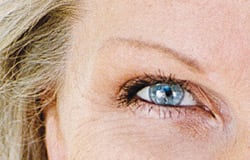- Science & Research
- Science News
- Newsletter
- 2013
- April 23

Newsletter
Newsletter
Long Term Nutritional Supplementation Reduces Progression Of Age Related Macular Degeneration
Long-term nutritional supplementation reduces progression of age-related macular degeneration
Tuesday, April 23, 2013. An article published online on April 10, 2013 in the journal Ophthalmology reports long-term benefit from supplementing with a nutritional formula containing antioxidants and zinc in men and women with age-related macular degeneration. Age-related macular degeneration (AMD) is characterized by the deterioration of the eye's macula, which results in impairment of central vision. Although there is currently no cure, a combination of beta-carotene, vitamins C and E, and zinc were associated with a reduction in the progression of the disease in a trial that concluded in 2001. For the current investigation, Emily Y. Chew MD of the National Eye Institute and her associates evaluated data from 3,549 follow-up participants in the Age-Related Eye Disease Study (AREDS), which enrolled 4,757 men and women from 1992 through 1998. Subjects were placed into one of four AMD categories according to the extent of drusen in each eye, the presence of advanced disease, and visual acuity. Participants were divided to receive a placebo, antioxidant vitamins (beta-carotene, vitamin C and vitamin E), zinc plus copper, or antioxidants plus zinc and copper until the trial's completion in 2001. The subjects were invited to participate in a follow-up study, during which annual eye examinations were conducted until November, 2005. Among participants whose macular degeneration was classified as category 2 (early), 3 (intermediate) and 4 (advanced or neovascular disease in one eye, or central geographic atrophy), those who received antioxidants plus zinc in the clinical trial continued to experience a significant reduction in the risk of developing advanced macular degeneration or neovascular age-related macular degeneration (characterized by abnormal blood vessel growth into the retina) by the end of the follow-up study, in comparison with the placebo group. Supplementation with antioxidants alone was also associated with a reduction in the disease's progression. A separate analysis limited the significance of the finding to subjects in category 4, for whom disease progression was evaluated in the eye that did not have advanced disease at the beginning of the study. Subjects in this category who received antioxidants plus zinc in the clinical trial had a 56 percent lower risk of developing advanced macular degeneration in comparison with those in the placebo group. They additionally experienced a reduction in moderate and severe vision loss. When mortality was analyzed, those who received zinc were found to have a 17 percent lower adjusted risk of dying from any cause over a median follow-up period of 10.5 years in comparison with those who did not receive the mineral. The protective effect was strongest against death from circulatory diseases. "Participants in the AREDS clinical trial who had been assigned to the antioxidant and zinc formulation continued to show a reduced odds of developing advanced AMD, especially neovascular AMD, 5 years after the clinical trial ended," the authors conclude. "We continue to recommend the use of the AREDS formulation in persons with intermediate AMD or advanced AMD in 1 eye and persons at moderate to high risk of developing advanced AMD." |
||||||||||||||||
 |
||||||||||||||||
|
||||||||||||||||
|
||||||||||||||||
 |
||||||||||||||||
|
||||||||||||||||
|
||||||||||||||||
The latest news on aging, nutrition, and vitamins
Lab
Testing
How Life Extension lab testing works











